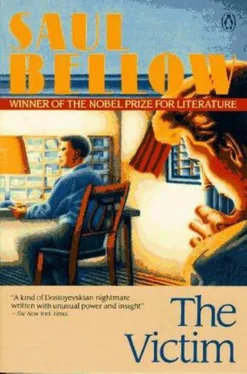Saul Bellow - The Victim
Здесь есть возможность читать онлайн «Saul Bellow - The Victim» весь текст электронной книги совершенно бесплатно (целиком полную версию без сокращений). В некоторых случаях можно слушать аудио, скачать через торрент в формате fb2 и присутствует краткое содержание. Год выпуска: 1988, Издательство: Penguin Books, Жанр: Современная проза, на английском языке. Описание произведения, (предисловие) а так же отзывы посетителей доступны на портале библиотеки ЛибКат.
- Название:The Victim
- Автор:
- Издательство:Penguin Books
- Жанр:
- Год:1988
- ISBN:нет данных
- Рейтинг книги:3 / 5. Голосов: 1
-
Избранное:Добавить в избранное
- Отзывы:
-
Ваша оценка:
- 60
- 1
- 2
- 3
- 4
- 5
The Victim: краткое содержание, описание и аннотация
Предлагаем к чтению аннотацию, описание, краткое содержание или предисловие (зависит от того, что написал сам автор книги «The Victim»). Если вы не нашли необходимую информацию о книге — напишите в комментариях, мы постараемся отыскать её.
The Victim — читать онлайн бесплатно полную книгу (весь текст) целиком
Ниже представлен текст книги, разбитый по страницам. Система сохранения места последней прочитанной страницы, позволяет с удобством читать онлайн бесплатно книгу «The Victim», без необходимости каждый раз заново искать на чём Вы остановились. Поставьте закладку, и сможете в любой момент перейти на страницу, на которой закончили чтение.
Интервал:
Закладка:
Presently he shoved a tip under the saucer and went out.
There was still a redness in the sky, like the flame at the back of a vast baker’s oven; the day hung on, gaping fierily over the black of the Jersey shore. The Hudson had a low luster, and the sea was probably no more numbing in its cold, Leventhal imagined, than the subway under his feet was in its heat; the trains rushing by under the gratings and along the slanting brown rock walls seemed to set off charges of metal dust. He passed through a small park where the double circle of benches were jammed. There were lines before each drinking fountain, the warm water limping and jetting into the stone basins. On all sides of the green square, the traffic of cars and cabs whipped endlessly, and the cumbersome busses crawled groaning, steering down from the tall blue oblong of light at the summit of the street through a bluish pallor. In the bushy, tree-grown corners, children played and screamed, and a revivalist band sang and drummed and trumpeted on one of the sidewalks. Leventhal did not stay long in the park. He strolled homeward. He thought he would mix a cold drink and lie down beside an open window.
Leventhal’s apartment was spacious. In a better neighborhood, or three stories lower, it would have rented for twice the amount he paid. But the staircase was narrow and stifling and full of turns. Though he went up slowly, he was out of breath when he reached the fourth floor, and his heart beat thickly. He rested before unlocking the door. Entering, he threw down his raincoat and flung himself on the tapestry-covered low bed in the front room. Mary had moved some of the chairs into the corners and covered them with sheets. She could not depend on him to keep the windows shut and the shades and curtains drawn during the day. This afternoon the cleaning woman had been in and there was a pervasive odor of soap powder. He got up and opened a window. The curtains waved once and then were as motionless as before. There was a movie house strung with lights across the street; on its roof a water tank sat heavily uneven on its timbers; the cowls of the chimneys, which rattled in the slightest stir of air, were still.
The motor of the refrigerator began to run. The ice trays were empty and rattled. Wilma, the cleaning woman, had defrosted the machine and forgotten to refill them. He looked for a bottle of beer he had noticed yesterday; it was gone. There was nothing inside except a few lemons and some milk. He drank a glass of milk and it refreshed him. He had already taken off his shirt and was sitting on the bed unlacing his shoes when there was a short ring of the bell. Eagerly he pulled open the door and shouted, “Who is it?” The flat was unbearably empty. He hoped someone had remembered that Mary was away and had come to keep him company. There was no response below. He called out again, impatiently. It was very probable that someone had pushed the wrong button, but he heard no other doors opening. Could it be a prank? This was not the season for it. Nothing moved in the stair well, and it only added to his depression to discover how he longed for a visitor. He stretched out on the bed, pulling a pillow from beneath the spread and doubling it up. He thought he would doze off. But a little later he found himself standing at the window, holding the curtains with both hands. He was under the impression that he had slept. It was only eight-thirty by the whirring electric clock on the night table, however. Only five minutes had passed.
“No, I shouldn’t have gone,” he said to himself. He was suddenly full of misgivings. It was a mistake to run out of the office like that. If he had considered the thing sensibly, he would have waited till evening. Five minutes more and Elena would have called him again. Then why hadn’t he waited? Did he actually want to stand Beard up for once, was that why he had left the office? No, and Beard’s remark was disgusting, besides. It did not come as a surprise. He had known all along that he was capable of making it. If a man disliked you, he would dislike you for all the reasons he could think of. It was not important, merely disgusting. All the same, he shouldn’t have gone. He washed his face, put on his shirt, and left the apartment. His difficulty, he reflected, was that when he didn’t have time to consider, when pressure was put on him, he behaved like a fool. That, mainly, was what troubled him. For instance, last week at the press Dunhill, the lino-typer, sold him a ticket he didn’t want. He protested that he didn’t care for shows and had no use for one ticket — this was before Mary left. But because Dunhill had insisted, he bought the ticket. He gave it to one of the girls at the office. Now if only he had been able to say at the outset, “I will not buy your ticket…” He muttered, “Well, what do I do it for?” frowning. One of his neighbors appeared, bare-chested and in tennis shorts, and deposited a clinking bag of bottles to be removed by the janitor.
The Porto Rican superintendent, Mr Nunez, in a straw hat, his dark feet in Chinese straw slippers, was sitting on the stoop. Leventhal asked him whether he had noticed anyone ringing his bell, and he answered that he had been on the stoop for half an hour and that no one had gone out in the last fifteen minutes or come in. “Maybe you heard the radio,” he suggested. “Sometimes I think somebody is in the house talking to me, but it’s the radio somewhere.”
“No, the bell rang,” Leventhal said positively; he looked seriously at the superintendent. “Was it the dumb-waiter bell, you think?”
“If somebody was fooling around the basement. I didn’t touch it tonight.”
Leventhal set out for the park. Perhaps it was a radio, though he did not think so. Perhaps something in the wiring, affected by the heat — he did not know much about electricity — or the dumb-waiter. What really concerned him was that perhaps his nerves were to blame and that he had imagined the ring just as he had imagined that he had slept. Since Mary’s departure his nerves had been unsteady. He kept the bathroom light burning all night. Somewhat ashamed of himself, he had yesterday closed the bathroom door before getting into bed, but he had left the light on. This was absurd, this feeling that he was threatened by something while he slept. And that was not all. He imagined that he saw mice darting along the walls. There actually were mice in the apartment. The building was old; there were bound to be some nesting under the floors. He had no dread of them, and yet he had begun to jerk his head around at the suspicion of a movement. And now he had been unable to fall asleep. Heat had never hitherto interfered with his sleep. He was sure he was unwell.
The park was even more crowded than before, and noisy. There was another revivalist band on the corner, and the blare of the two joined confusingly above the other sounds. The lamps were yellowed, covered with flies and moths. On one of the paths an old man, sunburned, sinewy, in a linen cap, was shining shoes. The fountain ran with a green, leaden glint. Children in their underclothing waded and rolled in the spray, the parents looking on. Eyes seemed softer than by day, and larger, and gazed at one longer, as though in the dark heat some interspace of reserve had been crossed and strangers might approach one another with a kind of recognition. You looked and thought, at least, that you knew whom you had seen.
Some such vague thing was in Leventhal’s mind while he waited his turn at the drinking spout, when suddenly he had a feeling that he was not merely looked at but watched. Unless he was greatly mistaken a man was scrutinizing him, pacing slowly with him as the line moved. “He seems to know me,” he thought. Or was the man merely lounging there, was he only a bystander? Instantly Leventhal became reserved, partly as a rebuff to his nerves, his busy imagination. But it was not imagination. When he stepped forward, the man moved, too, lowering his head as if to hide a grin at the thin-lipped formality of Leventhal’s expression. There was no hint of amusement, however, in his eyes — he was now very close; they were derisive and harsh.
Читать дальшеИнтервал:
Закладка:
Похожие книги на «The Victim»
Представляем Вашему вниманию похожие книги на «The Victim» списком для выбора. Мы отобрали схожую по названию и смыслу литературу в надежде предоставить читателям больше вариантов отыскать новые, интересные, ещё непрочитанные произведения.
Обсуждение, отзывы о книге «The Victim» и просто собственные мнения читателей. Оставьте ваши комментарии, напишите, что Вы думаете о произведении, его смысле или главных героях. Укажите что конкретно понравилось, а что нет, и почему Вы так считаете.











